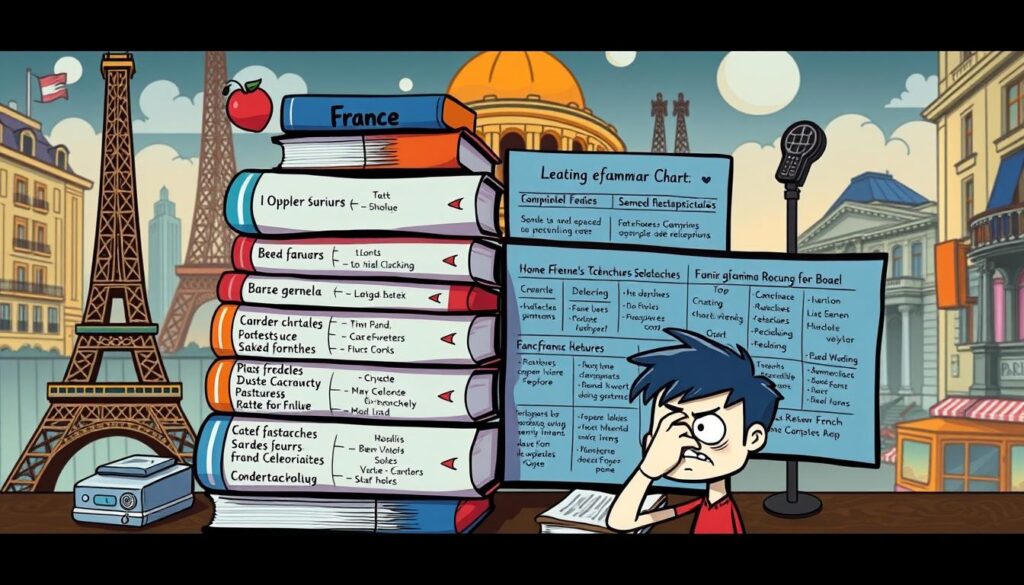Are you wondering “how long does it take to learn French for TEF?” The journey varies, but it’s all about a smart plan. A good plan involves structured study, daily practice, and using real French materials. Whether it’s for living in Canada, work, or citizenship, knowing French is key. Setting up a clear study plan is your first step to success.
The TEF Canada Exam, created by the Paris-Ile-de-France Chamber of Commerce & Industry, is very important for Canadian residency. Getting ready may seem tough, but with the right resources and a good plan, you’ll be set in 10-12 months. A solid plan means practicing every day, using different materials, and gradually increasing your study time.
Start with something easy, like listening to French for 30 minutes a day. Then, switch to tougher stuff like French films and deep conversations. To get as good as the DELF B2 level, you might need over 600 hours of study. But if you study smart and focus, you could be ready in 8-9 months.
Remember, learning French doesn’t just help with the TEF. It also adds points to your immigration profile for Canada. With competition high for Canadian immigration, every point helps. So focus your study on what the test will cover, like grammar and pronunciation.
For more tips, check the TEF preparation timeline. Start planning your study schedule today. Take on this challenge and move confidently towards French fluency.
Understanding the TEF Canada Exam and Its Importance
If you’re moving to Canada, it’s key to know about the TEF Canada exam. This test checks your French speaking skills. These are needed for living, working, or becoming a citizen in Canada.
TEF Canada Exam Overview: What You Need to Know
The TEF Canada test includes four main parts. It tests reading, listening, writing, and speaking in French. Each part has a set time, like 60 minutes for Reading and Writing, and 40 minutes for Listening. This setup helps improve your French fast.
The Role of the Paris-Ile-de-France Chamber of Commerce and Industry in TEF
The Paris-Ile-de-France Chamber of Commerce and Industry keeps the TEF Canada test fair and respected. They make the exam. This ensures it really shows how well you know French. Their work is key for immigration and living in Canada.
Why TEF is Essential for Work Permits, Residency, and Citizenship in Canada
Getting a TEF Canada score is crucial if you want to stay in Canada or work there. Since 2002, Immigration, Refugees and Citizenship Canada has used TEF to gauge French skills. It ensures you can fit in well in French-speaking parts of Canada.
In summary, knowing how the french language proficiency exam duration works helps you prep well for TEF. This gets you closer to living or working in Canada. It’s about fast-tracking your French skills for TEF and your future in the country.
How Long Does It Take to Learn French for TEF
Starting to learn French for the TEF is a big step. You need to know the time required to master French for TEF and the learning curve for TEF French. Every French level requires a set amount of study hours and your dedication.
The path to French proficiency for the TEF is made up of different stages. Let’s look at what each level involves:
| Level | Hours Required | Time Frame |
|---|---|---|
| A1 (Beginner) | 84 hours | 3 sessions, 5 months |
| A2 (Elementary) | 140 hours | 5 sessions, 8 months |
| B1 (Intermediate) | 200 hours | 7 sessions, 11 months |
| B2 (Advanced) | 230 hours | 8 sessions, 12 months |
Getting to B2 level often meets the needs of those seeking Canadian permits or residency. This level shows you can fluently interact in French for work or socializing.
If starting from scratch, aim for about 12 months to achieve solid fluency. You’ll likely need around 90 minutes of daily practice. Spend 30 minutes reading, 45 minutes listening, and 15 minutes on speaking to improve all language skills.
Moving forward, it’s key to grasp how each learning phase contributes to your progress. Additionally, include mock TEF tests often to boost your preparedness and confidence.
The learning curve for TEF French can change a lot based on your native language, learning surroundings, previous French knowledge, or familiarity with similar languages like Spanish. Those who know languages like Spanish might grasp French faster, but they’ll face their own challenges with pronunciation and grammar.
Ultimately, the time required to master French for TEF depends on your objectives, how consistently you study, and your effort level. Everyone’s journey is unique, yet reaching the TEF milestone is possible with structured study and smart practice.
Strategies for Achieving French Language Proficiency for TEF
Getting ready for the TEF Canada exam means you need a clear plan. Using best practices for TEF French language proficiency is key. Knowing the exam’s structure helps, and using accelerated French learning for TEF exam strategies makes a big difference.
Setting Realistic Goals for French Language Learning
To hit CLB Level 7 for the TEF Canada, start with 1-2 hours of study daily for three months. Then, bump it up to 2-3 hours as the exam gets closer. Online tutorials can really help, especially with understanding spoken and written French.
Essential French Language Skills to Focus on for TEF
Add lots of practice in listening, speaking, reading, and writing to your study schedule. Using everyday language tools like Duolingo or chat apps such as Hello Talk helps a lot.
Work hard on bettering your speaking and writing too. These parts matter a lot for scoring highly on the test. Let me give you a quick overview of the TEF Canada exam sections:
| Exam Section | Duration | Focus Area |
|---|---|---|
| Listening Comprehension | 40 minutes | Understanding spoken French |
| Written Comprehension | 60 minutes | Interpreting written text |
| Oral Expression | 15 minutes | Speaking accurately and fluently |
| Written Expression | 60 minutes | Writing clearly and effectively |
If you’re working or studying, plan on 10-12 months of prep. This timeline fits well for reaching fluency at DELF B2 level, equal to CLB 7.
The Learning Curve for TEF French: Managing Expectations
Starting to learn French for the TEF exam requires knowing the TEF preparation timeline and french language study duration for TEF. It often takes about 600 hours of study at each level. This could mean a year of full-time study. However, how long it really takes depends on your study habits and where you learn.
Making French part of your daily life and practicing regularly helps speed up learning. With many online tools and expert tutors available, you can customize your learning. This makes studying more effective.
- Over 3,030 French tutors are available on Preply, each with distinct cultural insights and years of teaching experience to customize your learning journey.
- These tutors vary in price from $3 to $100 per hour, making learning French accessible for any budget with an average price of $25 per hour.
- The personalized one-on-one sessions help focus your studies, boosting your TEF prep.
It’s important to understand your own pace of learning. Set realistic goals for mastering the French language. This will help you succeed in your TEF exam preparation.
| Resource | Description | Average Cost |
|---|---|---|
| Experienced Tutors | French teaching experts available internationally, offering personalized lessons. | $25/hour |
| Cultural Diversity | Tutors from various countries provide diverse linguistic and cultural perspectives. | Varies |
| TEF Focus | Specifically tailored sessions to enhance skills important for TEF success. | $3 – $100/hour |
Understanding the importance of flexibility and patience in language learning is key. It helps you set realistic expectations. This way, you can better plan your study time to become fluent in French for the TEF.
Immersive and Accelerated French Learning Techniques for TEF Exam
To do well on the french language proficiency exam duration, you need good techniques. This is especially true for the TEF Exam when time is short. Choosing immersive and accelerated french learning for TEF exam strategies is key. These methods should be fast and effective for learning the language.
Interactive Online Platforms and Resources for French Learning
The internet is filled with great tools for learning French fast. Ambitious students can find many resources that mix audio, videos, and text. This helps learn in different ways. Websites like LanguageYard offer interactive lessons that are great for the TEF exam prep.
Using French in Everyday Situations for Enhanced Language Retention
Using French every day can really boost your skills and confidence, important for the TEF exam. Talk with native speakers on apps or practice with friends. This real-life practice cements what you’ve learned and applies it practically.
Below is a plan for using immersive learning in a month-long intensive French course for the TEF Exam:
| Week | Focus Area | Hours | Activities |
|---|---|---|---|
| 1 & 3 | Core Language Skills | 32 hours | Grammar, Vocabulary, Oral Practices |
| 2 | Integration and Application | 16 hours | Role-plays, Group Discussions |
| 4 | Exam Preparation and Testing | 24 hours | Mock Exams, Strategy Workshops |
To sum up, accelerated french learning for TEF exam with immersive methods is crucial. It’s not just about the hours spent studying. It’s also about how you use those hours to interact with the language. This ensures a deep and wide understanding.
French for TEF: Key Grammar and Pronunciation Best Practices
To ace the TEF exam, knowing grammar and pronunciation is key. Start with basics like vocabulary for days, months, and colors. Also, learn key verbs’ conjugations. This foundation is crucial for the vocabulary and syntax test, which has 40 questions. Keep a French dictionary handy to build a strong vocabulary.
Experts suggest spending enough time studying. This helps in mastering important aspects. It is vital for passing the TEF exam.
Foundational Grammar Skills Necessary for TEF Success
Handwritten notes and regular review are great for remembering grammar rules. The reading section of the TEF exam has 40 questions over four parts. Understanding grammar well can boost your performance and your overall french language proficiency for the TEF. Aiming for a B2 level in 1 to 1.5 years with steady practice is doable.
Look for trusted study materials like “French for Dummies.” It helps improve faster.
Mastering French Pronunciation and Its Impact on TEF Scores
Pronunciation is crucial for a good TEF score. In the oral section of the exam, clear French helps ensure your answers are understood. This part of the test has 40 questions and lasts 40 minutes. Talking regularly with native speakers or professional tutors helps. They can fix minor mistakes that could cause confusion.
Programs like LingoRelic Language Academy are helpful for reaching the C1 level. This level is needed for higher studies or professional work.
In short, knowing French grammar and pronunciation well is crucial for TEF. Prepare by studying adequately, using good online resources, and joining coaching programs. This will help you succeed in the TEF Canada test.


